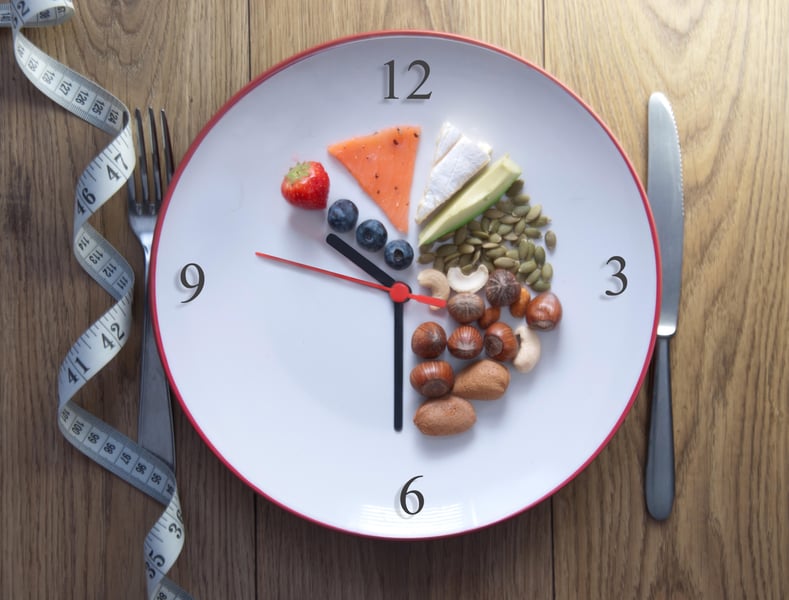Get Healthy!

- Alan Mozes
- Posted January 18, 2023
Do Fasting Diets Work? Study Finds Meal Size, Not Timing, Key to Weight Loss
When it comes to weight loss, what seems to matter most is how often and how much you eat, rather than when you eat.
That's the conclusion of a new study that focused on the eating habits of about 550 adults.
For six months, all were asked to use a phone app to report both the timing and size of all their meals.
"What we found is that, on average, the more meals people ate throughout the day, or the more large meals they ate throughout the day, the more likely they were to gain weight over time,"said study author Dr. Wendy Bennett.
By contrast, "eating more small meals during the day was associated with more weight loss,"added Bennett, an associate professor of medicine at Johns Hopkins School of Medicine, in Baltimore.
They found no link between when in the day people ate and any change in their weight.
Bennett stressed that the findings do not speak to the pros and cons of intermittent fasting, a popular dietary practice that involves abstaining from eating for fixed periods of time.
That's because "we didn't know people's intentions,"she explained. "We really just followed everyday free-living people, without asking anyone to change their behavior, and without knowing who did or did not want to lose weight."
So, she noted, "We can't draw any conclusions about intermittent fasting."
According to the American Heart Association (AHA), 4 in 10 Americans are obese. Bennett and her team wanted to gain some insight into the relative importance of when, how often and what people eat when it comes to weight control.
In 2019, the team recruited 547 adults who were primary care patients in three health systems across Maryland and Pennsylvania.
The patients' average age was 51, and about three-quarters were women. Roughly four in five were white, 12% were Black and 3% were Asian. More than 70% had a college education.
The average body mass index (BMI) pre-enrollment was pegged at nearly 31. A BMI of 30 or more is considered obese. Those with a higher BMI tended to be Black, older and more likely to have high blood pressure and/or diabetes.
All of the participants got a mobile application called "Daily24."The app enabled them to record their sleeping and eating routines on a daily basis for half a year, and to calculate meal habits.
The study participants' weight was tracked over six years.
After crunching the numbers, the research team concluded that regardless of current weight status there was no apparent link between when people ate their meals and any weight change.
On the other hand, routinely eating more large meals (1,000 calories and up) and/or more medium meals (between 500 and 1000 calories) was linked to a greater likelihood for gaining weight. Eating fewer meals and smaller meals (below 500 calories) was linked to weight loss.
Bennett pointed out that the demographic breakdown of the patients in the study is not representative of all Americans. And given the study's observational nature, it cannot prove cause and effect, she added.
Even so, "we have seen other studies that demonstrate that the key (to weight loss) is portions and calories,"said Connie Diekman, a food and nutrition consultant and former president of the Academy of Nutrition & Dietetics.
Diekman suggested that simply developing conscious eating routines -- whether involving strict fasting or not -- could be helpful to many seeking to lose weight.
"Many Americans eat more in a grab and go fashion, which decreases our recognition of how much we have eaten," she noted.
"As a registered dietitian, I help my clients assess where they struggle with eating,"Diekman explained. "If it is evident that they do not have any routine, we work on that first,"identifying the kind of meal portions and frequency that will work best for the patient at hand.
The study, funded by the AHA, was published online Jan. 18 in the Journal of the American Heart Association.
More information
There's more on the importance of meal portions at the U.S. National Institute of Diabetes and Digestive and Kidney Diseases.
SOURCES: Wendy L. Bennett, MD, MPH, associate professor, medicine, division of general internal medicine, Johns Hopkins School of Medicine, Baltimore; Connie Diekman, RD, MEd, food and nutrition consultant, former president, Academy of Nutrition & Dietetics; Journal of the American Heart Association, Jan. 18, 2023, online






